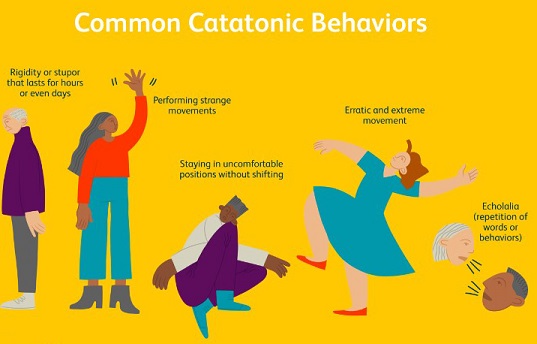Italian Researchers Warn That COVID-19 Infections Can Cause Catatonia- A Neuropsychiatric Condition!
Nikhil Prasad Fact checked by:Thailand Medical News Team Apr 02, 2024 1 year, 10 months, 1 week, 4 days, 17 hours, 6 minutes ago
COVID-19 News: In the midst of the COVID-19 pandemic, medical professionals around the world have been grappling with the diverse array of manifestations that this viral infection can present. While much attention has been understandably focused on the respiratory and systemic effects of the virus, there's an increasing recognition of its impact on neurological and psychiatric health. Among these emerging concerns is the association between COVID-19 and catatonia, a neuropsychiatric condition that warrants thorough investigation and understanding. A research team from the Psychiatric Service of Diagnosis and Treatment, "Santa Chiara" Hospital-Italy, Scuola Superiore Sant'Anna, Piazza Martiri della Libertà-Italy and University of Pisa-Italy have recently encountered three cases involving patients who developed Catanonia as a result of SARS-CoV-2 infections. This
COVID-19 News report covers these cases studies and the study teams’ findings.
.jpg) COVID-19 Infections Can Cause Catatonia- A Neuropsychiatric Condition
Understanding Catatonia: A Complex Neuropsychiatric Syndrome
COVID-19 Infections Can Cause Catatonia- A Neuropsychiatric Condition
Understanding Catatonia: A Complex Neuropsychiatric Syndrome
Catatonia, first described in 1874 by Kahlbaum, represents a multifaceted neurobehavioral syndrome characterized by a spectrum of motor, affective, and cognitive disturbances. Clinically, it can manifest as mutism, stupor, posturing, mannerisms, and other motor abnormalities. Historically, catatonia was often linked solely with schizophrenia; however, contemporary psychiatric classifications recognize it as a specifier of various mental disorders or a condition occurring alongside medical illnesses.
The underlying neurobiology of catatonia remains intricate and not entirely elucidated. Proposed mechanisms involve dysfunction in dopaminergic and Gamma-aminobutyric acid (GABA)-ergic pathways in the basal ganglia. Additionally, there's growing evidence implicating glutamatergic dysfunction, particularly highlighted in cases of catatonia associated with anti-NMDA receptor encephalitis.
The Emergence of COVID-19-Related Catatonia
With the onset of the COVID-19 pandemic, reports of neuropsychiatric complications, including catatonia, began to surface. This raised questions about the potential direct and indirect neurological impacts of the SARS-CoV-2 virus. It became evident that COVID-19 could lead to a spectrum of neuropsychiatric sequelae, ranging from cognitive deficits and attention impairments to more severe conditions like psychosis and catatonia.
Case Studies Shedding Light on the Connection
Examining specific cases helps illuminate the complex interplay between COVID-19 infection and the development of catatonia:
Patient 1
This patient had a history of bipolar disorder and obsessive-compulsive symptoms, with prior episodes of catatonia necessitating hospitalizations and electroconvulsive therapy (ECT).
Following COVID-19 infection a
nd subsequent pneumonia, she presented with full-blown catatonia, exhibiting mutism, rigidity, and withdrawal.
Despite attempts with pharmacotherapy including benzodiazepines and gradual ECT initiation, complications such as respiratory failure ensued, highlighting challenges in management.
Patient 2
A woman without prior psychiatric history developed psychotic depression and self-neglect following a period of social isolation due to COVID-19.
The emergence of catatonic symptoms, alongside depressive features, posed diagnostic and therapeutic dilemmas, necessitating a multifaceted treatment approach.
Patient 3
This patient experienced a post-vaccination febrile syndrome and subsequent COVID-19 infection, leading to a rapid progression to catatonia and autonomic instability.
Detection of anti-NMDA receptor antibodies in serum and cerebrospinal fluid (CSF) pointed towards a paraneoplastic syndrome, emphasizing the role of autoimmune mechanisms.
Exploring Pathogenic Mechanisms
Several hypotheses have been proposed to elucidate the pathophysiology of COVID-19-related catatonia:
-Neuroinflammation: The "cytokine storm" observed in severe COVID-19 cases can trigger neuroinflammatory processes, potentially disrupting neurotransmission systems involved in motor regulation.
-Direct Viral Effects: SARS-CoV-2's neuroinvasive potential raises concerns about direct viral damage to neuronal tissues, impacting neurotransmitter systems and neural circuits.
-
Autoimmune Reactions: Cases of anti-NMDA receptor encephalitis associated with COVID-19 suggest a possible autoimmune mechanism triggered by viral infection, leading to neuropsychiatric manifestations including catatonia.
 Challenges in Diagnosis and Treatment
Challenges in Diagnosis and Treatment
Diagnosing COVID-19-related catatonia presents challenges due to overlapping symptoms with other neuropsychiatric conditions and medical complications of COVID-19 itself. Treatment strategies often involve benzodiazepines and ECT; however, concerns about respiratory depression and delayed initiation due to COVID-19 infection pose significant clinical dilemmas.
Future Directions and Clinical Implications
As the medical community continues to navigate the complexities of COVID-19-related neuropsychiatric complications, several key considerations emerge:
-Longitudinal monitoring: Given reports of post-COVID neuropsychiatric symptoms, longitudinal monitoring for early detection and intervention is crucial.
-Biomarker research: Identifying neuroimmune biomarkers associated with COVID-19-related neuropsychiatric sequelae can aid in diagnosis and targeted treatment approaches.
-Therapeutic innovations: Exploring adjunctive therapies such as NMDA receptor antagonists for treatment-resistant catatonia may offer new avenues for improved outcomes.
Conclusion
COVID-19-related catatonia represents a significant yet poorly understood aspect of the pandemic's impact on neurological and psychiatric health. Through detailed case studies and exploration of underlying pathogenic mechanisms, we gain insights into the complexities of this condition. Moving forward, a multidisciplinary approach integrating neurology, psychiatry, and infectious disease expertise will be vital in effectively managing and mitigating the neuropsychiatric consequences of COVID-19.
The study findings were published in the peer reviewed journal: Psychiatry Research Case Reports.
https://www.sciencedirect.com/science/article/pii/S277302122400018X
For the latest
COVID-19 News, keep on logging to Thailand Medical News.
.jpg)
